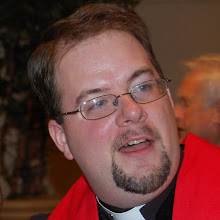It seems like an odd handle or moniker to choose for my blog, now 4ish years after I started...and it's trickled out to other places on the web, notably Twitter. Yet I still think it's worthwhile to consider myself an emigre clergyperson. Here's why.
As I graduated from Candler School of Theology (Emory U., Atlanta) in May 2005, a lot of things were changing. I was about to not be a student for the first time in 20 years. I was only 18 months married, with my first child about to arrive. I headed to Texas for commissioning to ministry, yet I wouldn't be serving in my home state...I was headed across the pond to the British Methodist Church for a year. So when I created my blog as I began serving in the UK, "expatriate minister" was a pretty good summary for how I felt, with the bonus that it provided a unique perspective in the blogosphere.
Well, a year later, I was headed back to the United States, the United Methodist Church, and a new appointment to campus ministry. Did "Expatriate Minister" still apply? After reflecting on my experience whilst being stationed on the Scunthorpe Circuit and about what I might be called to do in campus ministry, the answer was: yes!
Campus ministry involved stepping out of my own cultural setting and entering a new one. If it was less visible a transition than moving across the Atlantic, it was that much harder to make precisely because of the invisible lines that separated me from the college students that inhabit Lamar.
All ministry, I have come to realize, requires becoming an expatriate. It involves leaving your assumptions, your culture-of-origin, your customs, even your identity to some extent behind. You have to adopt the attributes and identity of the people you are sent to--otherwise, being from another culture or country will truly make you an "alien."
This is what United Methodists call "itinerancy." It's being open to the leading of the Holy Spirit to move to a new place, minister in a new way, live out the love of God incarnationally among new people. Even if you are in the same place from year to year, you and I still have to itinerate out from behind the desk, out from the walls of the church, out from the "good church people" to bring the gospel message to those who need it most.
Finally, it means having the assurance of your true home in God's kingdom and not in any earthly habitat. Whether you have only known one home, or there are too many to count, our true home is not constructed by us amongst our expectations and self-made security. Our safety, our comfort, our home is with God...and wherever we find God's people at work building God's kingdom, we are no longer expatriates, but at home.
"But our citizenship is in heaven, and it is from there that we are expecting a Saviour, the Lord Jesus Christ." (Philippians 3:20, NRSV)
As I graduated from Candler School of Theology (Emory U., Atlanta) in May 2005, a lot of things were changing. I was about to not be a student for the first time in 20 years. I was only 18 months married, with my first child about to arrive. I headed to Texas for commissioning to ministry, yet I wouldn't be serving in my home state...I was headed across the pond to the British Methodist Church for a year. So when I created my blog as I began serving in the UK, "expatriate minister" was a pretty good summary for how I felt, with the bonus that it provided a unique perspective in the blogosphere.
Well, a year later, I was headed back to the United States, the United Methodist Church, and a new appointment to campus ministry. Did "Expatriate Minister" still apply? After reflecting on my experience whilst being stationed on the Scunthorpe Circuit and about what I might be called to do in campus ministry, the answer was: yes!
Campus ministry involved stepping out of my own cultural setting and entering a new one. If it was less visible a transition than moving across the Atlantic, it was that much harder to make precisely because of the invisible lines that separated me from the college students that inhabit Lamar.
All ministry, I have come to realize, requires becoming an expatriate. It involves leaving your assumptions, your culture-of-origin, your customs, even your identity to some extent behind. You have to adopt the attributes and identity of the people you are sent to--otherwise, being from another culture or country will truly make you an "alien."
This is what United Methodists call "itinerancy." It's being open to the leading of the Holy Spirit to move to a new place, minister in a new way, live out the love of God incarnationally among new people. Even if you are in the same place from year to year, you and I still have to itinerate out from behind the desk, out from the walls of the church, out from the "good church people" to bring the gospel message to those who need it most.
Finally, it means having the assurance of your true home in God's kingdom and not in any earthly habitat. Whether you have only known one home, or there are too many to count, our true home is not constructed by us amongst our expectations and self-made security. Our safety, our comfort, our home is with God...and wherever we find God's people at work building God's kingdom, we are no longer expatriates, but at home.
"But our citizenship is in heaven, and it is from there that we are expecting a Saviour, the Lord Jesus Christ." (Philippians 3:20, NRSV)








1 comment:
I was wondering what the name meant! And as a fellow CM, I wholeheartedly agree with you on this!
Post a Comment